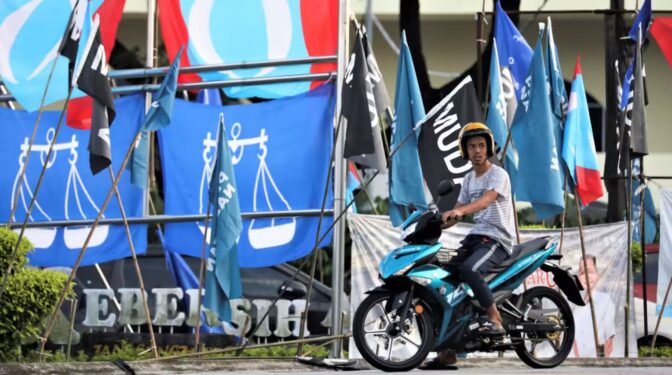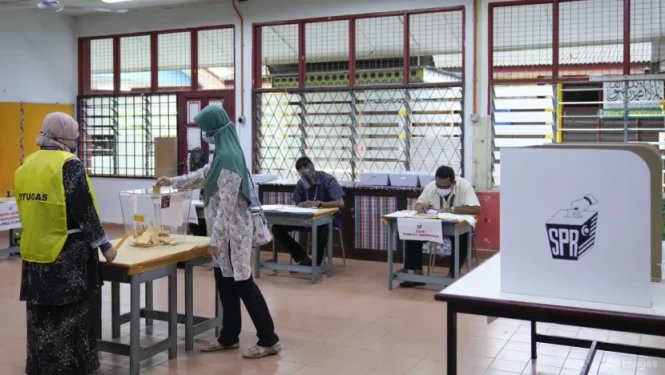A FRAGMENTED majority is a problem for stability in any country.
Malays make up a significant majority of Malaysia’s population, and when Malays are socially and politically fragmented, any ruling government of the day would constantly be wielding a slim majority at best, leading to perpetual political instability.
The need for unity among the Malays isn’t based on negative racial sentiments, but rather, a necessity of stable administration based on factual population demographics.
According to the Department of Statistics Malaysia (DOSM) based on 2020 data, the percentage of citizens populations by ethnic group is 69.9% Malays, 22.6% Chinese, 6.8% Indians and 1% others.
Accordingly, a similar percentage was observed in the 2018 14th general election (GE14) voter demographic.
Unfortunately, the highly fractured Malay politics nullifies the strength of the majority, which is a reflection of the state of the Malays – a divided community.
This is evident from the plethora of Malay-dominated (or Malay-majority) parties such as United Malays National Organisation (UMNO), Parti Keadilan Rakyat (PKR), Parti Pribumi Bersatu Malaysia (Bersatu) and Parti Islam Se-Malaysia (PAS).
Relatively newer ones (or recently more known) include Parti Bangsa Malaysia (PBM) and parties in the Gerakan Tanah Air (GTA) coalition, consisting of Parti Pejuang Tanah Air (Pejuang), Parti Bumiputera Perkasa Malaysia (Putra), Barisan Jemaah Islamiah Se-Malaysia (Berjasa) and Parti Perikatan India Muslim Nasional (Iman).
The Malaysian United Democratic Alliance (MUDA) may also split the Malay votes to a considerable degree, particularly among urban Malay youth.
The nearly 10-way split of the Malay votes is spread thin across the four major coalitions – Barisan Nasional (BN), Perikatan Nasional (PN), Pakatan Harapan (PH), and GTA.
Malaysian Chinese have generally been united in their support for the Democratic Action Party (DAP), and although parties such as Gerakan and Warisan could pose as competitors, the split isn’t to the same degree as the Malays.
The state of the political landscape explains why even post the 15th General Election (GE15), many expect that a government would be formed based on a coalition of convenience, with the leading peninsula coalition partnering with the leading parties in Sabah and Sarawak.

The weak bond arises from the nature of partnerships built on strategic necessity instead of alignments in core principles. The resulting instability manifests as party infighting, irreconcilable tension between coalition parties and the resultant politicking of coalition breaking and creation.
Thus, a fractured majority works against stability, as evident now and in recent years.
Ideally, unity should be transcendental. In fact, the establishment of a united Malaysian nation made up of one “Bangsa Malaysia” (Malaysian Race) was the top item out of nine other social challenges listed in Malaysia’s Vision 2020, presented back in 1991.
Unfortunately, or expectedly, Malaysia stumbles toward creating a united Bangsa Malaysia, attributable to the failure of the education system and other key institutions, rooted in the inability or the lack of will to contain the widening racial and religious rift.
If anything, political parties have been formed to capitalise on ethnicity, race and religion because that is still the level of society that we are in.
The toxic state of politics which openly (perhaps even intentionally) create racial and religious tensions is a simultaneous reflection of the state of the country’s leadership and the people.
Similar to how businesses will try to fulfil market demand, so would politicians sing to the tune of the mindset of the people.
Unless we can reform the education system, the family unit and other key institutions and organisations for at least a generation, blood and beliefs will always be thicker than water.
Therefore, expecting a united Bangsa Malaysia as things are right now is simply ignoring reality.
After many decades of unfulfilled promises and lip services, it is perhaps impractical to suddenly expect politicians to pursue national unity, and it is simply naïve to believe that every politician is sincere.
This brings us back to the consideration of uniting the Malays, via a bond that they all can and should agree to.
According to the key findings on the population and housing census for the year 2020 by DOSM, it would appear that practically all Malays are Muslims.
Malaysia’s historical context, the fact that Malays make up nearly 70% of the population by race and Muslims make up 63% of the population by religious beliefs provide the demographic basis for Malay rights, leadership and the protection of the Islamic faith as enshrined in the constitution.
Malay-Muslims also make up a majority of the country’s key political institutions, public services and security forces.

Democracy favours the majority, but this in no way means minorities take a back seat, and a Malay-Muslim majority is not an excuse for discriminatory and polarising racial and religious rhetoric.
If anything, Islam is against racism, chauvinism or religious extremism.
Again, it is worth emphasising that the issue of Malay-Muslim unity isn’t based on negative racial or religious sentiment, but rather on a factual necessity of stable administration for all.
Of course, the prerequisite is that the Malays in power and the administration of the country possess the necessary qualities – trustworthiness, integrity and competency to implement fair policies and uphold justice for all, not just the Malays.
Any value-based leadership philosophies would push for justice for all, but since Islam appears to be the common denominator among Malays, the “moral anchor” to values is clearly defined and provided by the religion.
Thus, they should hold on to the true teachings of Islamic Leadership, which is fair and equitable to all.
Given Malay-Muslims make up the majority of the population, whoever can unite the Malays and get them to uphold value-based leadership principles such as those clearly outlined in Islamic leadership principles, would have the best chance to bring stability to Malaysia.
Though a monumental task, uniting Malays through the proper teachings of Islam is the practical (and more reasonable) step towards achieving Bangsa Malaysia, as it is the foundation for Malay leadership that is competent and just to all.
It must be reminded that Muslim unity is a divine imperative. Both the Qur’an and the Sunnah make it clear that Islamic unity and brotherhood are necessary for the fulfilment of the societal goals of Islam. But unfortunately, the Malays have not been giving Islamic unity and brotherhood the attention it deserves.
Allah tells us in the Holy Qur’an of the destruction of ancient civilisations that were plagued with corruption, excesses, decadence and iniquities. And we don’t have to go too far back in history to observe similar devastation of a nation or a group of people.
As mentioned by an expert in religious studies from the University of Nairobi, Dr Hassan Kinyua Omari, analysing key events in the 21st century – such as the Arab uprising in Egypt, wars and conflicts in Iraq, Syria, Libya, Egypt, Yemen, Somalia and many others – the conclusion is that these were related to injustice. We can add the recent 2022 Sri Lankan violent uprising also in the list.
As the saying goes, those who do not learn from history are doomed to repeat it. – Nov 14, 2022
Ameen Kamal is the Head of Science and Technology at EMIR Research, an independent think tank focused on strategic policy recommendations based on rigorous research.
The views expressed are solely of the author and do not necessarily reflect those of Focus Malaysia.
Main pic credit: Bernama









